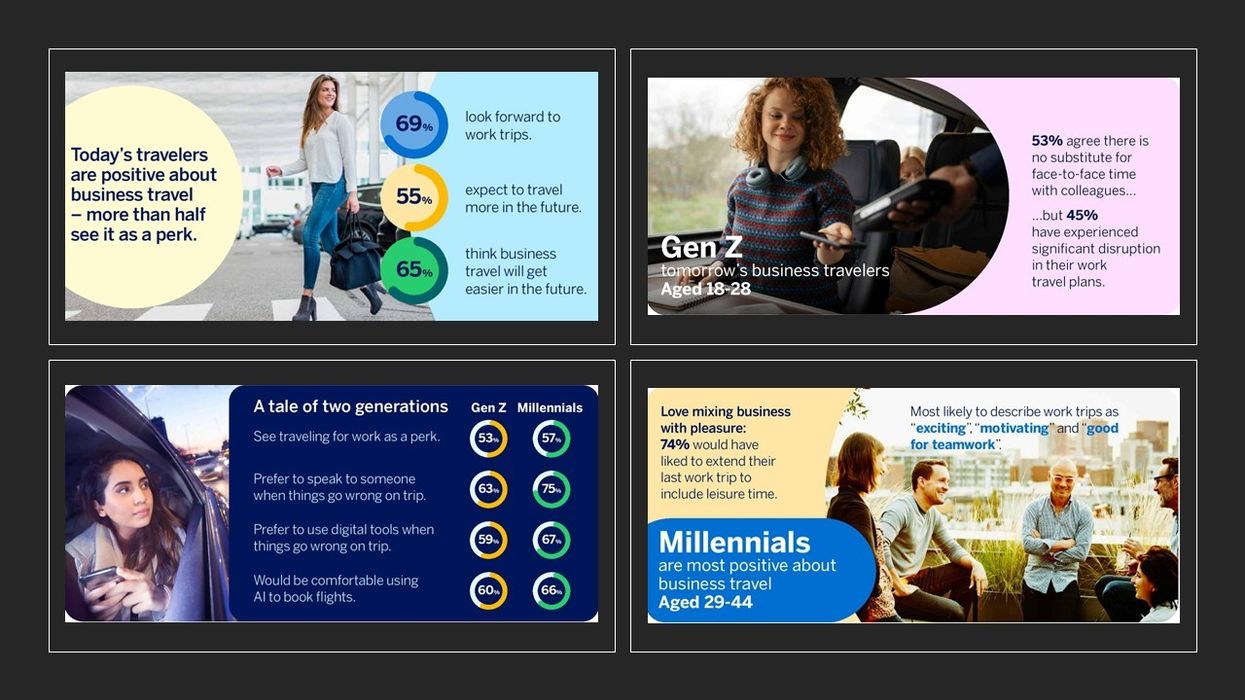Ipsos Amex GBT 2025 Study: Business Travel Trends and Gen Z Challenges
NEARLY 70 PERCENT of travelers look forward to business trips, but generational differences are evident, according to a recent Ipsos UK and American Express Global Business Travel study. However, Gen Z is least likely to recognize their employer's responsibility to care for them during work trips, with 63 percent agreeing, compared to 68 percent of all business travelers and 73 percent of Millennials.
The Meet Tomorrow’s Business Travelers study, surveying over 1,800 business travelers in the U.S. and U.K., highlights the need for better education and communication on business travel policies and support services.
“We see that Gen Z workers recognize how business travel can enable career growth and connection in a more disrupted world,” said Evan Konwiser, Amex GBT's chief product and strategy officer. “That said, we know that traveling can be an emotional experience, especially when disrupted. As an industry, it is important that we find the right balance of digital self-service and human support to meet the needs of today’s and tomorrow’s traveling workforce. When you combine AI with human talent, you unlock exceptional user experiences while managing corporate policies and programs.”
While 70 percent of Gen Z respondents, aged 18 to 28, look forward to work travel, they also report higher stress, disruption and difficulty compared to older generations. Meanwhile, older Millennials, aged 29 to 44, are the most positive about traveling for work and more likely than other generations to view business travel as beneficial for their career, motivating and conducive to teamwork.
Navigating travel disruption
A majority of travelers across all generations who experienced disruption to work travel plans over the past year say they felt well supported by their employer—84 percent in the U.K. and 90 percent in the U.S. Gen Z travelers report higher levels of disruption in their work travel plans, with 45 percent affected, compared to 36 percent of Millennials and 32 percent of Gen X.
The report found that when travel is disrupted, six in ten business travelers across generations are interested in using digital and self-service tools, while seven in 10 prefer human assistance—highlighting the need for a blend of human and tech support.
More than half of respondents across all generations report being comfortable with generative AI handling tasks such as booking flights at 62 percent, completing expense reports at 60 percent, and booking hotels and restaurants. However, Millennials consistently show higher comfort with GenAI than Gen Z. Despite being seen as a "digital native" generation, 60 percent of Gen Z travelers are less likely than 66 percent of Millennials to feel comfortable using GenAI to book flights.
The report also found that across generations, employers face multiple opportunities and challenges in keeping business travelers satisfied and secure on the road.
Key takeaways include:
- Combining work with pleasure or 'bleisure' travel: Nearly two-thirds, or 62 percent, of U.S. and UK business travelers have extended work trips for leisure, and 52 percent have incorporated work into leisure trips, raising discussions about work-life balance and compliance.
- Personal values heard: Nearly two-thirds, or 65 percent, say their employer allows them to stick to their personal values while traveling. The most frequent travelers, those who have taken at least 11 flights for work in the past two years, feel this more strongly, with 78 percent agreeing.
- Remote and hybrid workers on travel: Among remote workers, 40 percent say opportunities for travel would be a top factor when considering a new job. When asked about the purpose of their last work trip, hybrid workers were more likely to report a wider range of travel categories, with 55 percent citing client work, including project work, relationship building, and sales meetings, compared with 49 percent of remote and 47 percent of location-based workers.
- Expectations for more travel and easier experiences: More than half, or 55 percent, of respondents across generations expect to travel more for work in five years, with two-thirds believing travel for work will become easier in the future.
Kelly Beaver, chief executive of Ipsos in the UK and Ireland, said the past few years have been challenging for both employers and employees, with those entering the workforce for the first time finding it especially difficult to settle in.
“We know from our own experience, and from research conducted by our specialist employee research team at Ipsos Karian and Box, that time spent together—whether collaborating in offices or onsite with our clients—has a significant, positive impact on employee advocacy and connection,” said Beaver. “In our wider work, we are also seeing Generation Z report higher stress levels than other generations, presenting businesses and brands with an opportunity to understand how to respond and make things easier.”
MMGY's “Portrait of American Travelers” study found that Americans are traveling more in 2025 than in the past five years, despite financial pressures. Travelers plan to spend $5,138 and take 4.2 vacations in the next 12 months, the highest in five years.






